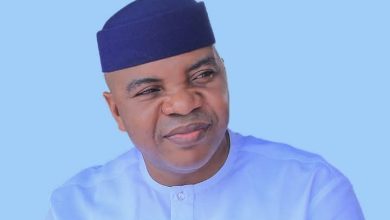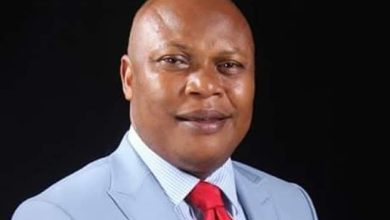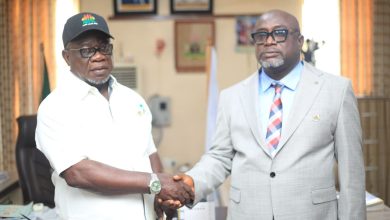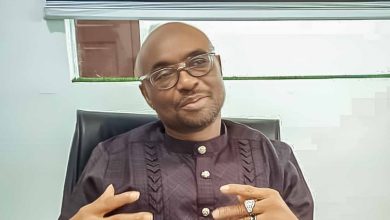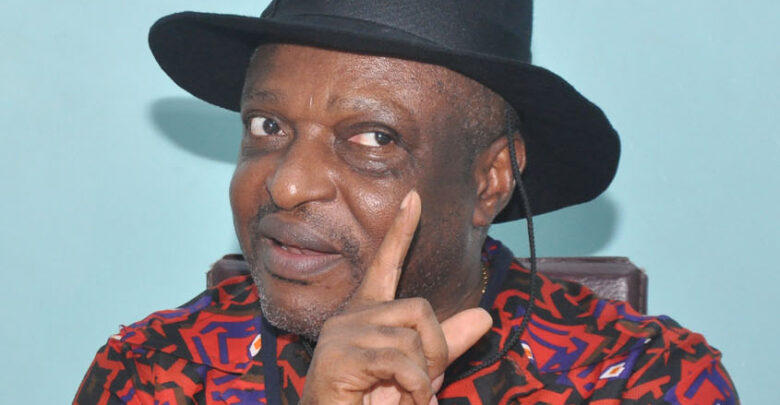
Prof. Hilary I. Inyang, African Academy of Science member, former Duke Energy Distinguished Professor of Environmental Engineering and Science and director of the Global Institute of Energy and Environmental Systems of the North Carolina Charlotte, USA.
Prof. Inyang who has previously served in key intellectual and institutional leadership positions including: DuPont Professorship at the University of Massachussetts, Lowell, USA; Chairmanship of the US Environmental Protection Agency’s Science Board (Engineering Committee) in Washington DC, USA, for two terms; Presidency of the Africa University and Science Technology (AUST), Abuja, Nigeria, and Vice Chancellorship of the Botswana International University of Science and Technology (BIUST), Palapye, Botswana, speaks on a wide range of issues in this exclusive interview with Crystal Express.
Let us meet
I am Professor Hilary Inyang, born in 1959. My name of course is Hilary Inyang Inyang. Before now it was Hilary Amos Inyang, I decided to use the former to honour my Africaness.
I hail from Nsit Atai of Akwa Ibom State and my father was a community leader; a well-educated man. I went through many primary schools because my father was a teacher who was always on transfer. My mother was a teacher too. My father was the principal of Etinan Institute and a number of other secondary schools in the state and president of Association of School Principals. After primary school I attended Nigerian Christian Secondary School, Ukpum in Abak Local Government Area of the state. I owe much of my basic foundation development to the training I got from that school. They are very interested in science and sports.
Though very young when I left the school I got a scholarship to study in the University of Calabar, I read geology there with the scholarship I got from the Nigerian government. I read geology because in 1969 when we were hiding in the village, my maternal grandmother went with about seven women in the village to go and dig for clay which is used in making earthen red pot; unfortunately it rained and there was a landslide which buried all of them alive and people were saying that the geology was bad and it killed them.
I never knew then what geology was but I was determined to find out what killed my grandmother. So when my choice of course of study came in the University of Calabar, I opted for geology out of curiosity. I have a Ph.D in geotechnical engineering. I left for the United States in 1989 to join the number of other students from other parts of the world. When I got there I studied civil engineering. I did a bachelors in civil engineering because I didn’t want people to say that I don’t have the basic fundamentals to be an engineer. Fortunately I was able to complete that in two years; did my master’s degree in eight months and did my Ph.D in two years.
Before I finished my Ph.D which I did in geotechnical engineering and materials, I was lucky to be appointed an assistant professor in the University of Winsconsin in 1988. I was the first black man to serve in that position then. In 1991, I was called up to Washington DC to serve as federal adviser in science and that was my first entry into the affairs of the US government. Fortunately Algiers who was the chairman of the U.S Senate on Environment became the vice president of the country and was deeply interested in global climate change.
Notwithstanding my then radical position on issues in the USA, I was elevated to the position of the chairman of the U.S Science Advisory Board on Engineering and Environmental Sector and member of National Advisory Council on Environment and Technology. I went to Washington DC in 1991 and stayed there till 1995 and fortunately was appointed distinguished professor on environmental science and engineering and director of International Institute at University of Massachusetts. I served in those positions under the administration of George Bush and then under Bill Clinton.
I led many expeditions in various parts of the world such as Serbia, China and so many countries. In 1999 I was invited when Olusegun Obasanjo became Nigeria’s President with the Niger Delta conflict still raging. Before then I was invited by Sani Abacha. Obasanjo asked me to become minister of environment but due to the jobs I was handling in the US, I suggested Ime Okopido and he was made the minister of environment. I also suggested my friend, Hassan Adamu, who was earlier Abacha’s ambassador to the US but he changed his mind on Adamu. I created National Oil Spill and Detection Agency (NOSDRA) at the University of Massachusetts and came here to Nigeria to help establish it. I remember Obasanjo asked Okopido to come stay with me for two weeks at Massachusetts to study some of these things. I was nominated to be under the secretary-general of the United Nations in 2008 even though as s USA, candidate, I had the blessing and support of Obasanjo and moved round canvassing for votes. Unfortunately I lost and when I was offered the position of the assistant secretary I turned it down. After that I held several positions in various fields. For my efforts I got the Nigerian Government Medal Award for my contributions in science. I was also invited to Abuja by the Buhari-led government to develop Nigeria’s 10-year road-map for science and technology which I did. I spent one year in Abuja in 2017, after that I was invited to Akwa Ibom to handle the present job I am doing.
What are you doing presently in Nigeria and Akwa Ibom State?
The reason I am in Nigeria and the state is because of the commitment I made to the Akwa Ibom State Government when I was called to chair the education think-tank and then education summit which we did massively. One of the recommendations from the education summit is that we should convene a board of experts to come up with a detailed design to rescue the educational sector. This state has a very large educational heritage that is why I am in the state.
Read Also: Unemployment Saga: Renowned Scholar, Prof. Inyang Faults NBS’ Rating Of Akwa Ibom
Do you think government in this clime has shown enough interest and commitment to education?
To answer that, there are seven mechanisms by which government of any political jurisdiction can improve standards and programmes for their own people in any socio-economic sector, education included. They are co-ordination, implementable regulations, policy technical support systems, market incentives, monitoring, research and statistics and finally enforcement. So the answer to your question is that African government and systems are lacking in the above mentioned mechanisms. So the direct answer is no, there are still a lot to be done. There are many reasons for that which include lack of funding, lack of political will and poor prioritization. Sadly if you ask an African child what career path they want to follow, the answer will be politics- to become a politician, be a council chairman, commissioner and to the exclusion of the real things.
Politics is not a profession but a quasi profession. Somebody is supposed to have carved a niche for himself before becoming such things.
Akwa Ibom State will be celebrating 33 years of statehood. In your opinion, has the state fared well?
I will be very frank to answer the question. In terms of heritage my direct answer is yes. Our progenitors tried to make it possible to divide the state into smaller economic developments units. The state upon creation did not have the present population which I put at 7.024 million people but managed to get 31 local government areas. The implication is that they were getting more money to develop at small special scale, whereas there are bigger states in landmass and other indices with fewer local government areas. So there are greater potentials for developments to penetrate clans and villages here.
The other sector to look at is the resources and expenditures. We cannot focus on one administration and the state is found wanting in better strategic planning. This has nothing to do with the current administration because planning has not always been very strategic in the state from inception. Planning is not possible without the inclusion of knowledge which is the basis of planning. I am here today because I was invited to contribute. Was it like this before now? No. Prof. Akpan Ekpo, Senator Udo Udoma etc were all invited by the governor because he wants knowledge to be brought into the system. The governor should be given credit for that intellectual courage. It is not easy bringing together people who may not agree with him. There is no guarantee that someone like me will agree with anybody. I have been thrown out of some countries by the presidents by maintaining my principled stance.
Education wise the state is not at the level it should be and you cannot blame the incumbent governor as he is trying to rescue the sector. The rots in the educational sector have been cumulative from earlier administrations. So with all the efforts currently going on such as recruitment of teachers, building of schools, training and re-training become dwarfed by the enormity of the cumulated challenges. Therefore, it takes time to recover and make progress in the sector and that is why I am here to help design the system that works.
So what is the way forward for the educational sector here?
The full report of what my committee has done will be coming out next month which is a comprehensive analysis of the educational system of the state. I must say that the vision to have this job done is that of the governor and he alone should take credit. He organized and assembled intellectuals from everywhere for the education summit and sat through the event and attended all the sessions and persuaded people like me and other big shots in various fields in the Diaspora to come and contribute.
The challenges of the educational sector in this state are in three major areas. One is infrastructure, second is equipment and furnishing, and the third is programmes and processes. We have to categorize these challenges in these three areas in order to make them amenable for the design of the system to handle them. In the area of infrastructure, there are many dilapidated buildings. Government has tried to build more school blocks and renovated some but there has been an explosion in the number of school children. The state has not been able to implement the percentage of the budget which is 27 per cent as recommended by the United Nations Education, Scientific, and Cultural Organisation (UNESCO) and others.
It is a case all over Nigeria. No state has given to the educational sector anything remotely close to the UNESCO standard. The state is committed to free education and pays money to State Universal Basic Education Board (SUBEB). Free education is very expensive and gulps quite a chunk of the state’s annual budget. In the area of equipment, Akwa Ibom State Government recognized the challenges there and convened the education summit to look for ways to address the problem. The truth is that the governor is totally committed to turn around the educational future of the state.
Those are the challenges but we have designed 17 initiatives such as intervention in the area of infrastructure, intervention in the area of equipment and furnishing, intervention in the areas of programme and processes; among them are teachers training and recruitment. Analysis shows that this state needs to hire 1000 teachers a year in order to keep up with the appropriate teacher-student ratio that is required to teach students well. We are to deal with the issue of cultism and truancy of students in the state at all levels, except nursery school.
We have a programme for that. It is inevitable to say that we have both formal and informal education and to state clearly also that education is not just for degrees. Education must provide enlightenment at both the village and clan levels to even help boost democracy. This is the reason why I was recently hosted by the 31 state monarchs with the Oku Ibom as chairman where I shared this knowledge. We plan to collaborate and establish adult education in all the villages as enlightenment centres for the general citizens. There will be several programmes under this. Akwa Ibom has been a knowledge-based state which became noticeable since the days of Ibibio State Union.
Akwa Ibom Government has introduced free education and do you think the quality as seen today is beneficial to our children?
It cannot be argued that free education is not beneficial at this point in time. The caveat is that free education is an intervention to help financially stressed parents but my experience in many countries and from empirical record is that as good as free education is presently, it cannot be sustained for too long. In my own opinion, I have established 2026 as the time to stop free education. The reason is that it could not be affordable because of the ever increasing number of pupils and students. I have done a simple calculations looking at people in primary and secondary schools to see what the enrolment demand will look like in the near future.
Governments everywhere in the world soon develop funding fatigue for education sector because there are also pressing needs from other sectors. No country or state will sacrifice everything in the budget just for free education. Education is free for the people not for government. The feasible thing in the future will be government subsidization in education rather than being entirely free because it leaves such a financial burden on government.
What is your take on the plight of the Niger Delta whose resources are used to develop other parts of the country but nothing to show in its domain?
Much depends on the socio-economic and political construct of the country. In the United States government’s incomes are not majorly from resources in the states but from taxes. Government allows the private searchers do those things and they will be taxed and they use the taxes to develop the country. However, the Nigerian system is focused on taking the resources to the centre and sharing them.
If we are to transit to a better system, it should be for the states to take control of their resources and pay taxes to the centre. All we need is to have a very good tax collection system so that we can have enough resources for the centre to work and do what they want to do. Nigeria concentrating resources at the centre is one of the reasons for corruption.
Development of Nigeria will be done best in desegregation which means that the centre should not hold majority of the country’s wealth. From my many years of interaction with people managing the central government in Nigeria, I have noticed lack of interest, lack of capacity and desire to get things done for the people and country. I think the reasons are because most of the challenges are in the state and lower rungs of government. The people at the centre are very far away from those challenges. They are either less concerned about the challenges or bereft of the means to solve them. Nigeria will fare a lot better if more powers are given to the state. The Nigerian system has shown that the centre is too slow with concentration of powers on the centre.
I have not seen a federal programme that is deployed with efficiency devoid of political undertones. I think Nigeria will develop better if development is organized and programmed at smaller jurisdictional level in the states. Much should have happened between the state and the local government if corruption can be reduced. The idea of having local government is to ensure that the development reaches smaller units. But today local governments in Nigeria are being ravaged by corruption of the worst kind. We heard stories of allocations being taken and shared.
The challenge of having development concentrated at unit level is how to curtail corruption but it remains the best opinion. Decentralization remains the best model for Nigeria’s development which gives control of resources to the state while the centre handles issues like defence, judicial system like the supreme courts and few others. The majority should go to the states which are closer to the people and they can deal with their value peculiarities of their circumstances.

